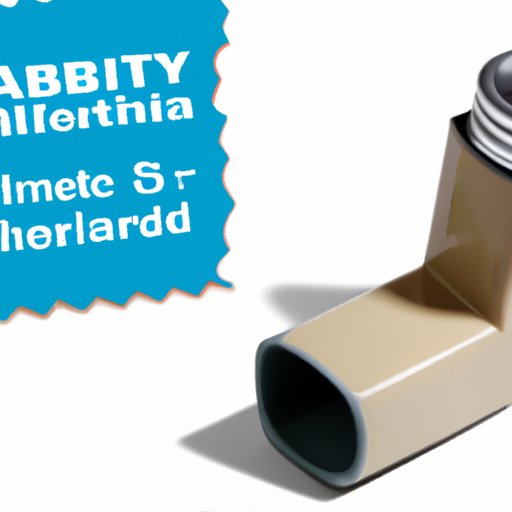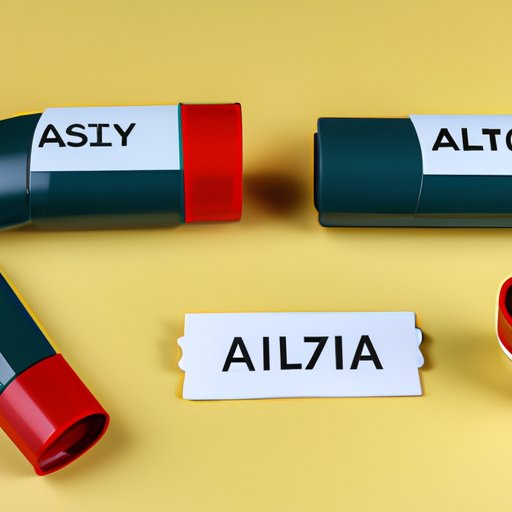
I. Introduction
As someone who relies on an inhaler to improve your breathing, you may wonder whether you can safely use an inhaler that has passed its expiration date. While the answer is not a simple one, it’s essential to understand the risks and benefits of using an expired inhaler. In this article, we’ll explore the topic in depth and provide tips for determining whether your inhaler is still effective.
II. The Risks and Benefits of Using an Expired Inhaler: What You Need to Know
Using an expired inhaler can lead to potential dangers and reduced effectiveness. The primary risk of using an expired inhaler is decreased effectiveness, which could worsen your symptoms and ultimately affect your ability to breathe. Additionally, expired inhalers can cause potential side effects, ranging from mild effects, such as headaches and tremors, to severe issues like an increased risk of seizures.
While there are some possible benefits of using expired inhalers, such as cost savings, the risks often outweigh the benefits. We recommend speaking with a healthcare professional before using an expired inhaler, even in situations where a refill is not immediately available.
III. How to Tell If Your Inhaler Has Expired: A Guide for Patients
Determining whether your inhaler has expired is essential for ensuring that you receive the full benefits of the medication. The following tips can help you determine whether your inhaler has expired:
1. Look for the expiration date: It may seem obvious, but the expiration date is the first place to check. Most inhalers include an expiration date on the packaging or label, which is typically two years from the date of manufacture.
2. Check for signs of wear and tear: Even if your inhaler hasn’t expired, it may not be effective if it’s been damaged or has excessive wear and tear. Check the canister for any visible signs of damage, such as dents or punctures.
3. Consider the length of time since last use: If you haven’t used your inhaler in a while, it’s essential to check the expiration date. Medications can degrade over time, even if the inhaler is new.
If your inhaler has expired, disposing of it immediately is the best course of action. In some cases, healthcare professionals may recommend using it until a new inhaler is available, but this decision should be left to them.
IV. The Science Behind Inhaler Expiration Dates: Why They Matter
The expiration date on inhalers isn’t arbitrary and plays a crucial role in ensuring your safety and medication effectiveness. Medications break down over time, and the slower the breakdown, the longer the medication will last. Inhalers contain a specific amount of medication, and when the expiration date arrives, the potency of the ingredients decreases, meaning that they may no longer work as effectively as they did before they expired.
The potency and effectiveness of the drug can be affected by factors like light and heat, which may accelerate the breakdown of the medication. In the end, using an expired inhaler can increase the likelihood of breathing difficulties and even cause serious harm to your health.

V. Alternatives to Expired Inhalers: What to Do When You Run Out
Situations may arise when you find yourself without an inhaler and unable to refill your prescription immediately. In such a case, there are various alternatives that you can consider, including:
1. Alternative medications or treatments: Speak to your healthcare provider to find suitable replacement options. Your doctor or pharmacist may recommend an alternative inhaler or another medication to help manage your symptoms until you can refill your inhaler prescription.
2. Managing symptoms without medication: While having an inhaler is essential, you may not always be able to access one. For this reason, consider learning relaxation techniques, deep breathing exercises, and other techniques to help alleviate symptoms of asthma or COPD until you can obtain your medication.
VI. The Bottom Line on Using Expired Inhalers: Expert Advice
The experts are in agreement that using an expired inhaler isn’t recommended unless prescribed by a healthcare professional. Most respiratory specialists and healthcare professionals recommend following the expiration date of inhalers to ensure safety and optimal effectiveness. Ultimately, the risks of using expired inhalers outweigh the benefits significantly. Speak to a healthcare professional if you have concerns about whether you should use an expired inhaler.
VII. Frequently Asked Questions About Expired Inhalers: Answering Your Concerns
Some common questions and concerns that you may have about using an expired inhaler include:
Q1: Is it safe to use an expired inhaler?
A: Generally, no. Using an inhaler after the expiration date can be dangerous and may cause severe harm to your health.
Q2: What happens if you use an expired inhaler?
A: Using an inhaler after the expiration date can lead to reduced effectiveness, increased risk of side effects, and may not work as intended.
Q3: Is it possible to use an inhaler past its expiration date?
A: Some healthcare professionals may recommend using an inhaler past its expiration date, but it should only be used as a last resort. Before doing so, speak to a healthcare professional.
VIII. Conclusion
In conclusion, using expired inhalers can be risky and lead to potential health complications. It’s essential to follow the expiration dates on inhalers, and in cases of expired inhalers, dispose of them properly. Remember, using alternative therapies and managing symptoms may be a viable option instead of using expired inhalers. Always consult a healthcare professional for advice and guidance on what to do when you have an expired inhaler concern.





